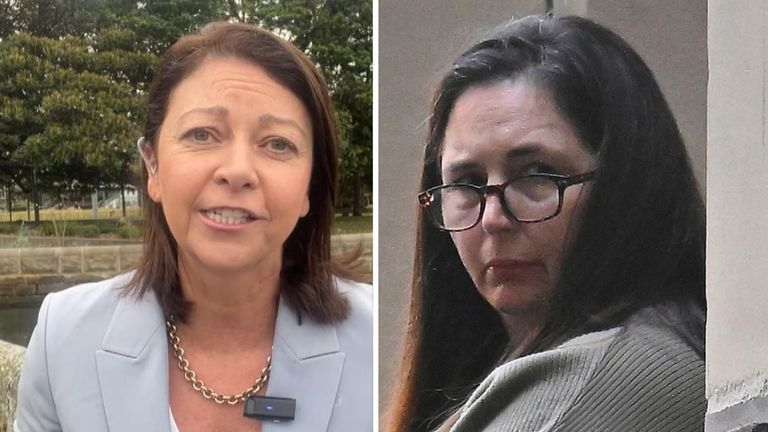Tight fiscal leash awaits winner of Nigeria presidential election
Ahead of the February 25 presidential vote, Africa’s largest economy is in a precarious position due to rising debt and low revenue.

For Nneka Ekpenisi, a physics teacher in Nigeria’s southern Delta state, remaining committed to the country’s public education system can be difficult, especially as skilled professionals continue to leave the country in high numbers.
It does not help that teachers earn meagre salaries, sometimes as low as 30,000 ($65) naira monthly.
A lack of basic resources also “makes it hard to create a proper environment for learning,” Ekpenisi, who is in her early thirties, told Al Jazeera. “Without access to standard lab equipment, my students sometimes struggle to focus.”
Despite the United Nations Educational, Scientific and Cultural Organization (UNESCO)’s recommendation that developing countries allocate up to 25 percent of their yearly budgets to education, Nigeria’s budget for the sector is an average of 8 percent.
Amid growing frustration over underfunded public services, nationwide insecurity and a stagnant economy, voters in Africa’s most populous nation are growing weary of Abuja’s entrenched political elite.
Ekepnisi is among 37 million people aged 18-34 – Nigeria’s largest electoral cohort and a third of the total 93 million registered electorate – eligible to vote in this weekend’s general elections. With a median age of 18, the country’s young population are hungry for change.
After eight years in office, incumbent Muhammadu Buhari will be stepping down as president.
The leading candidates to replace him are Bola Tinubu of the ruling All Progressives Congress, Atiku Abubakar of the opposition People’s Democratic Party, Peter Obi of the Labour Party and Rabiu Kwankwaso of the New Nigeria People’s Party.
Due to limited and sometimes controversial polling data, the outcome remains difficult to predict.
But irrespective of who wins, Nigeria’s new president will inherit a precarious economic situation. The country’s high debt servicing costs suffocate spending on public services, like education and infrastructure investment, and limit the government’s ability to stimulate growth.
In January, ratings agency Moody’s lowered Nigeria’s credit score from B- to Caa1 – a category considered at high risk of default, or non-repayment.
Admittedly, the ratings agency acknowledged Nigeria’s manageable debt-to-GDP (gross domestic product) ratio, at 34 percent in 2022. In absolute terms, that amounts to roughly $103bn in outstanding liabilities. But Moody’s also raised concerns about the country’s debt repayment capacity.
This January, finance minister Zainab Ahmed revealed that Nigeria spends 80 percent of its taxes paying off outstanding debt. By comparison, the World Bank recommends a debt service-to-revenue ratio of no more than 22.5 percent for low-income countries.
Scant fiscal resources
Unlike regional peers, Nigeria’s repayment challenges relate primarily to the country’s low state revenues. According to International Monetary Fund projections, tax-to-GDP ratios across sub-Saharan Africa averaged 15 percent in 2022. In Nigeria, the figure was just seven percent.
Nigeria’s scant fiscal resources are, in part, linked to its oil and gas sector. Crude oil exports account for half of government revenues and 90 percent of foreign exchange earnings, leaving state funds vulnerable to changes in the price of fossil fuels.
Output also fluctuates due to poor maintenance and the sabotage of installations in the oil-rich Niger Delta. As Nigeria’s oil refineries are mostly colonial-era relics with little or no refining capacity today, this has also left Africa’s second-largest oil producer having to export crude and import refined products.
Related to this, the high cost of Nigeria’s petrol subsidy (under which car owners enjoy some of the cheapest fuel in the world, at roughly $0.40/litre) to help fuel importers keep retail prices of petroleum products low has become controversial.
Experts say this goes beyond the enormous corruption linked to the subsidy system. Last year, the government allocated more money to fuel subsidies than to education and healthcare combined.
“The petrol subsidy stops Nigeria benefitting from higher oil prices and limits investment in more important areas,” said Ese Osawmonyi, a senior analyst at SBM Intelligence, a Nigerian sociopolitical risk consultancy. “Fuel subsidies should be phased out in favour of more reliable domestic revenues, like higher value-added tax [VAT] and income tax.”
Further down the supply chain, some of Nigeria’s oil never makes it to filling stations. Estimates vary, but according to research from the Stakeholder Democracy Network, 5-20 percent of annual oil output is stolen, costing the government billions in lost revenues.
To tackle the documented history of corruption and pipeline vandalism in Nigeria’s oil industry, enforcement of the legislation has to step up, analysts say.
According to Osawmonyi, “trust in the government can be restored by tightening punishment for looters, which would deter theft in the future”.
This may prove challenging, however, as Nigeria’s underfunded and overstretched military has been engaged in a decades-long conflict against armed groups in the northeast and separatist militias in the northwest. Security forces have also struggled to contain ransom-motivated kidnappings in recent years.
Increasing revenue generation
Away from the oil industry, Nigeria’s non-resource sector remains undercapitalised. It is estimated that one-third of Nigerians are unemployed, leaving a big gap in lost tax receipts. Revenue collection has also been held back by informal economic activity, which goes untaxed.
Though difficult to measure, Nigeria’s informal economy may have swelled to 57 percent of its GDP in 2022 but getting people to pay taxes has also been tough.
For decades, economists have debated the root causes of this. Some say inadequate state institutions, a dearth of public infrastructure as well as insufficient private investment rank high on the list.
“The key is incentivising people to want to pay tax. The new administration would do well by matching informal workers with decent public services,” said Akpan Ekpo, professor of economics at the University of Uyo.
“Nigeria’s new president should prioritise improving power and healthcare supply. Getting people to contribute to state services they would benefit from has the potential to reduce our reliance on oil. It would also be politically popular,” he suggested.
Nigeria’s opaque multiple exchange rate system acts as a further drag on revenue generation. Adopted in 2016 to avoid a devaluation of the naira, the multi-window scheme has spawned a vast unofficial market. Pundits have long argued that supporting multiple rates undermines export activity and curbs foreign investment.
“I would urge authorities to collapse the number of exchange rates. They could intervene to support one crucial import and export rate. A managed float, as opposed to a purely market-determined rate, may help to foster much-needed industrial development,” added Ekpo.
Over the past year, the naira’s devaluation has nudged up inflation to 18 percent. To combat this trend, the central bank raised its benchmark rate to 17.5 percent in January, extending Nigeria’s longest monetary tightening cycle in 12 years.
“On the one hand, monetary authorities will want to get inflation under control. On the other, they don’t want to choke off growth … which would add to unemployment and slow tax collection even further,” said Virág Fórizs, Africa economist at Capital Economics.
High borrowing costs look set to constrain investment and consumption, just as concerns over a global recession have started to undercut oil prices.
“Given the wider economic backdrop, high interest rates look set to be temporary. Once price pressures start easing, authorities’ focus will likely shift to stimulating growth and lifting unemployment, especially among the under-25s,” Fórizs said.
The technical specifics don’t seem to matter to many everyday Nigerians like Ekpenisi, who just want economic growth, translating to more money in their pockets and operational public infrastructure.
The secondary school teacher remains wary about Nigeria’s near-term prospects but hopes the upcoming election will boost opportunities for Nigeria’s young population.
“This vote is about the youth,” she told Al Jazeera. “Hopefully the next president won’t let them down.”
-al jazeera







